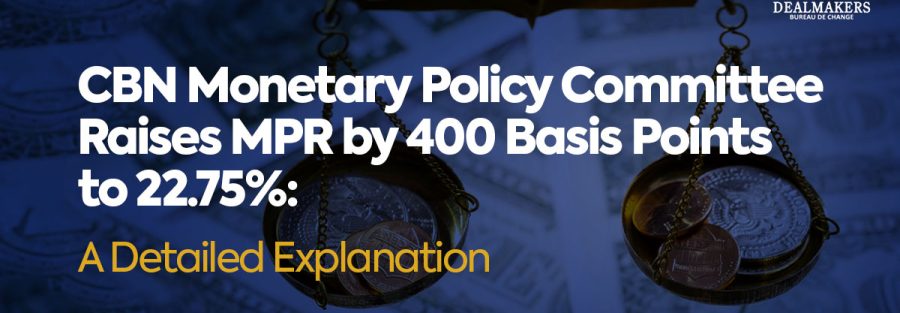On February 27, 2024, Nigeria’s Monetary Policy Committee (MPC) made a bold move, increasing the monetary policy rate by a substantial 400 basis points to 22.75%. This decision, which aims to tackle inflation that reached a 28-year high of 29.9%, was coupled with an increase in the cash reserve ratio to 45%. These measures signal a firm commitment to tightening monetary policy and stabilizing the economy, aligning Nigeria more closely with global economic trends and seeking to restore confidence in its financial markets. So today I will be explaining what MPR rate means and its impact on the economy and as a bonus I will be throwing in cash reserve ratio, liquidity ratio, and assymetric corridor.
Let’s jump into understanding the objectives of the CBN and what this increase means;
In a very simple term- The monetary policy rate is a benchmark interest rate set by the Central Bank of Nigeria to regulate monetary conditions within the economy. It is like a rule for banks, telling them how much interest to charge when they lend money. So, if you want to borrow from a bank today, you’ll have to pay 22.75% plus a little more based on the bank’s internal rules.
The purpose of this is to discourage people from borrowing in the bank thereby reducing cash in circulation in the economy.
The thinking behind this is that, if there is less cash in the economy, then demand will drop, and a decrease in demand will further reduce the prices of commodities in the market thereby reducing inflation.
But as with all things, this move by the CBN comes with both sides of the coin.
Cash Reserve Ratio CRR was also adjusted from 32.5% to 45%.
Cash Reserve Ratio (CRR) is the percentage of money, which a bank has to keep with CBN in the form of cash.
So what this means is that, if a bank records a daily deposit of 20 million, they have to compute 45% of 20 million (N9 million) and send it to CBN for safekeeping.
On one hand, the CBN is discouraging individuals from borrowing due to high interest rates, on the other hand, they are also ensuring that the bank keeps higher reserves with the aim that they have little money to give out as loans.
Furthermore, for every N1 deposited in the bank, 30 kobo must be kept in the bank’s vault. This is to make sure the bank always has enough money to give back to people who want it.
Lastly, there’s something called the Asymmetric Corridor. It’s like a deal between commercial banks and the Central Bank. If a bank needs to borrow money from the Central Bank, it has to pay a bit more interest, but if the Central Bank borrows from the bank, it pays a bit less interest. It’s like a special way they do business.
So in this instance- if a commercial bank wants to borrow money from CBN, it has to pay a 23.75% interest rate (MPR rate + 1%) while the CBN borrows from a commercial bank at 15.75% (MPR rate- 7%)
NB- 100 basis points is 1% and 700 basis points is 7%
In a nutshell, these rules set by the Central Bank are mainly to control inflation. It’s like a way to manage how much money is moving around so that prices don’t go up too quickly. By making it a bit harder to borrow and asking banks to keep more money, the CBN hopes to keep things steady and prevent prices from rising too fast.
Side note: All this can also be done in reverse in situations where the CBN is trying to pump money into the economy i.e. MPR rate and the CRR will be reduced.
We hope this breakdown has done justice to understanding the CBN’s most recent economic move.



